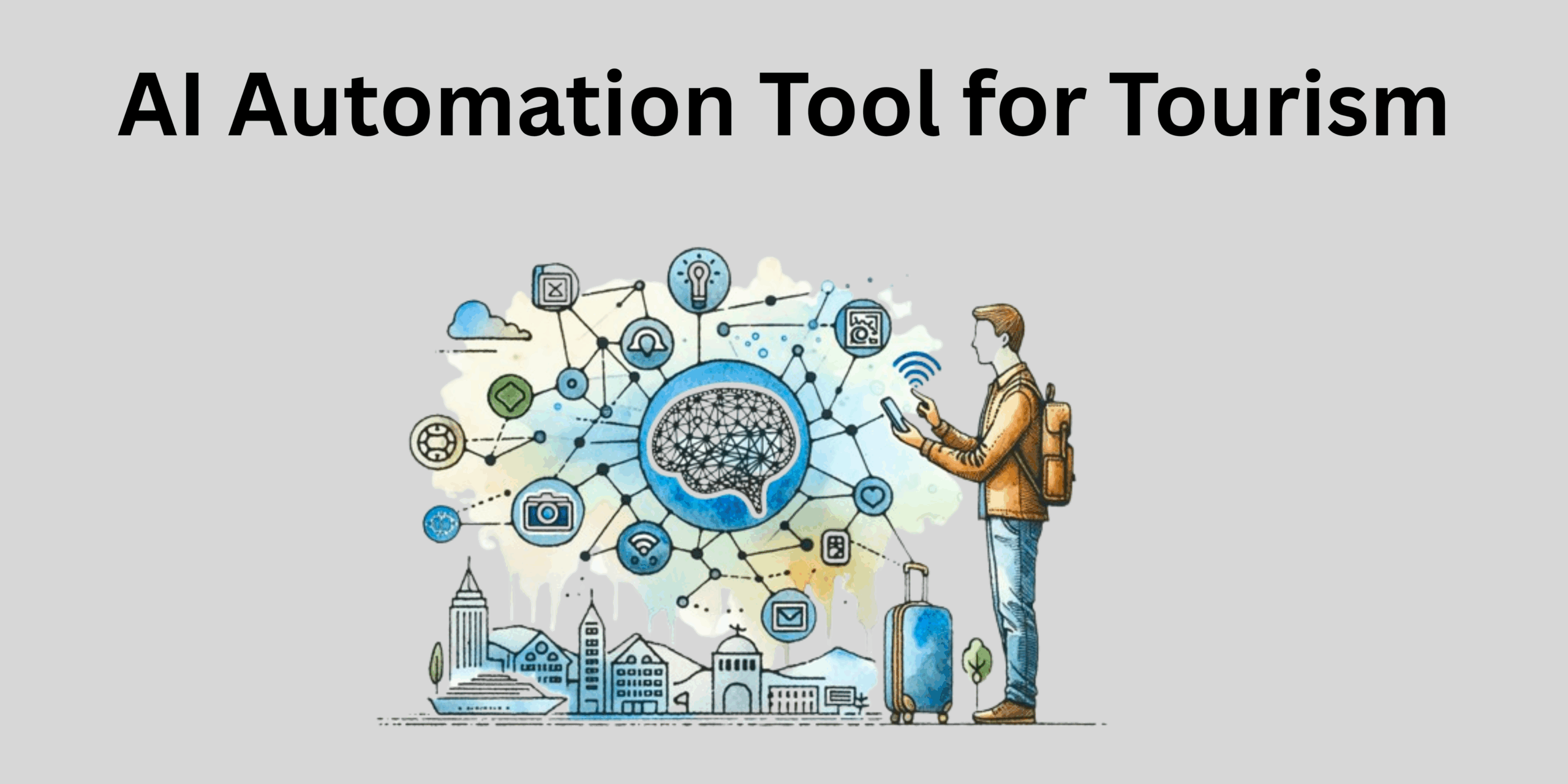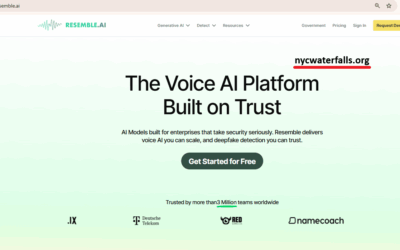Learn how AI automation solutions revolutionize travel and tourism by improving consumer experiences, optimizing workflows, and increasing productivity.
Introduction
The tourism industry is experiencing a digital revolution, and artificial intelligence (AI) is at the heart of this transformation. With travellers demanding faster, more personalized, and seamless experiences, AI automation tools are becoming essential for travel agencies, tour operators, and hospitality businesses.
These advanced technologies enhance customer satisfaction through intelligent recommendations and instant support and improve backend efficiency with smart booking systems, predictive analytics, and automated logistics.
As competition intensifies in the global tourism market, embracing AI in travel and tourism is no longer optional—it’s a strategic necessity for businesses seeking to stay ahead, deliver value, and redefine the travel experience in a rapidly evolving digital world.
Understanding the Importance of AI Automation Tools in Tourism
The tourism industry is undergoing a significant transformation fueled by artificial intelligence (AI) advancements. As travel and hospitality businesses embrace the digital age, AI automation tools for tourism have become pivotal in shaping customer experiences and improving backend operations.
Deploying smart technologies, from AI-powered tourism solutions to machine learning in the tourism industry, enables travel companies to offer faster, more efficient, and highly personalized services.
With global tourism expected to reach over $2 trillion in spending by 2030, implementing artificial intelligence in tourism is no longer optional—it’s a competitive necessity.
AI automates everything from customer service in the tourism industry through chatbots and virtual assistants to AI-driven booking systems and predictive analytics for tourism trends. These tools optimize resources and meet the evolving demands of modern travellers who expect convenience, speed, and customization.
The Current Landscape of AI Automation in the Tourism Industry
In recent years, the travel sector has seen an exponential increase in the use of AI. Technologies like virtual travel assistants, AI itinerary planners, and AI for personalized travel experiences are commonplace in many travel applications and platforms.
Major players in the tourism and hospitality sector are integrating tourism software with AI to improve decision-making, manage logistics, and deliver enhanced user engagement.
One of the most compelling uses of AI in tourism is travel logistics, which includes route planning, hotel availability forecasting, and transportation management. Travel logistics encompasses all the complex backend activities that ensure smooth travel experiences.
AI simplifies these processes, ensuring that resources are allocated efficiently and that real-time updates can be seamlessly provided to customers.
For instance, AI travel agents and AI-driven itinerary planners can analyze travellers’ preferences, past behaviour, and reviews to offer custom travel packages.
Meanwhile, AI-powered tools in hospitality management can anticipate room service needs or recommend local attractions. These innovations showcase how artificial intelligence in travel is reshaping user expectations and business models.
Key Benefits of Using AI Automation Tools for Enhancing Customer Experience

One of the standout advantages of AI automation in tourism is its ability to provide hyper-personalized experiences. AI tools for enhancing customer experience in tourism use data analytics to understand traveller behaviours, allowing companies to offer recommendations that align perfectly with customer desires. For example, personalized travel recommendations include suggested destinations, hotel upgrades, or dining options based on dietary preferences.
A Salesforce study revealed that 84% of customers say being treated like a person, not a number, is crucial to winning their business. This stat emphasizes the value of personalization in the travel industry, which AI tools are particularly good at delivering.
Tools such as AI content generators for tourism marketing can also create tailored messaging and promotional campaigns, boosting engagement rates across digital platforms.
Moreover, customer service automation in tourism using AI chatbots and virtual assistants ensures 24/7 support without human intervention. These smart agents can manage bookings, answer FAQs, and escalate complex queries, reducing wait times and improving overall satisfaction.
Customer care in tourism has been revolutionized, with businesses now capable of handling thousands of inquiries simultaneously and consistently.
How AI Automation Tools Improve Operational Efficiency in Tourism
Beyond customer interaction, AI automation tools for the travel industry play a pivotal role in streamlining internal operations. AI-driven booking systems help automate reservation processes, detect fraud, and optimize pricing strategies.
They rely heavily on predictive analytics for tourism trends to forecast demand and adjust supply accordingly, resulting in increased revenue and minimized losses.
For instance, AI in the travel industry is often used in dynamic pricing models where machine learning algorithms assess historical data and current trends to set real-time prices. Hotels and airlines leverage this to fill capacities at the best rates.
Furthermore, tourism AI tools can automate repetitive tasks such as updating availability, sending notifications, and processing payments, allowing human staff to focus on strategic initiatives.
In regions with high tourism influx, like Switzerland, AI is also used to manage infrastructure load and traffic routing. While driving in Switzerland might seem difficult for newcomers due to its strict rules and mountain roads, AI-enabled navigation systems provide real-time route suggestions that ease travel experiences and reduce congestion.
Best Practices for Implementing AI Automation in Tourism Businesses
Businesses must adopt a strategic approach to effectively integrating AI automation for travel agencies. This starts with selecting the best AI automation tools for tourism businesses that align with their goals, improving customer service, enhancing marketing, or optimizing logistics.
Companies should invest in tourism marketing automation tools to streamline campaign management. These tools often come with AI capabilities that allow for A/B testing, audience segmentation, and performance prediction, enhancing ROI significantly.
The average increase in qualified leads for businesses using marketing automation is 451%.
Equally important is training employees on how to work alongside AI. Staff should understand how AI in tourism functions, from chatbots to AI-powered customer service systems, ensuring smooth human-AI collaboration.
Businesses must also focus on data privacy and ethical considerations, particularly when using AI in hospitality management to handle sensitive customer data.
Integration with legacy systems is another key area. Many traditional tourism industry software platforms are not built to support AI modules. Adopting modular, API-based systems ensures that AI-powered tourism solutions can be incorporated without major disruptions.
Future Trends and Innovations in AI Automation for the Tourism Sector
Looking ahead, the future of AI in the travel industry points toward deeper personalization, voice-enabled interfaces, and immersive experiences through AR and VR. As the digital transformation in travel continues, travellers will expect AI to assist them and anticipate their needs before they even voice them.
One of the emerging concepts is that of an AI tourist—a completely automated virtual assistant that handles every aspect of the travel journey, from planning and booking to check-ins and post-trip follow-ups. This aligns with the rise of virtual travel assistants and AI bots capable of easily navigating complex multi-stop itineraries.
Voice AI is also gaining traction. AI travel agents are now accessible through smart speakers and wearables, providing real-time updates, local recommendations, and translation services. For example, users looking to watch Japanese channels on Spectrum abroad could instantly rely on AI to find compatible services and access instructions.
Other innovations include AI tools for personalized travel experiences that use emotional analysis and sentiment detection to refine travel suggestions, ensuring emotionally satisfying journeys. Meanwhile, AI content generators for tourism marketing are expected to become more sophisticated, creating engaging, SEO-optimized copy for websites, social media, and email campaigns.
Conclusion
In conclusion, AI automation tools for tourism are reshaping the global travel industry. The benefits are manifold, from enhancing customer satisfaction to streamlining operations and driving revenue growth. Integrating AI in tourism, artificial intelligence in travel, and smart tourism solutions enables businesses to remain agile, competitive, and customer-centric.
Whether through AI-driven itinerary planners, tourism customer service automation, or predictive analytics for tourism trends, the future is firmly rooted in intelligent automation.
Adopting AI-powered tourism solutions is becoming a strategic necessity as companies traverse the changing terrain.
Adopting AI automation for travel agencies and machine learning in the tourism industry represents the next big leap for travel companies and professionals seeking sustainable growth.
With technologies evolving rapidly and customer expectations rising, investing in AI in the travel industry ensures a forward-looking, efficient, and enriched travel experience for all.
FAQS
1. What is an AI automation tool in tourism?
A. AI automation tools in tourism use artificial intelligence to streamline tasks like bookings, customer service, marketing, and travel planning. These tools help improve efficiency, personalize travel experiences, and support 24/7 customer interactions.
2. Does the travel sector employ artificial intelligence?
A. AI is used in the travel industry for personalized itinerary planning, automated booking systems, customer support via chatbots, predictive trend analysis, and smart marketing. It helps businesses deliver faster, more tailored services.
3. What is a virtual travel assistant?
A. A virtual travel assistant is an AI-powered tool that helps travellers plan, book, and manage their trips by providing personalized suggestions, updates, and real-time assistance.
4. Are AI-driven booking systems reliable?
A. Yes, AI-driven booking systems are highly reliable and efficient. They automate reservation processes, detect fraud, optimize pricing, and provide real-time availability updates.
5. How will AI affect travel in the future?
A. The future of AI in tourism includes voice-enabled travel assistants, deeper personalization, virtual and augmented reality experiences, and predictive analytics to anticipate traveller needs before they arise.



0 Comments